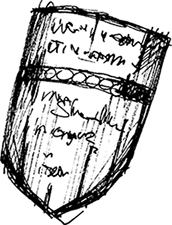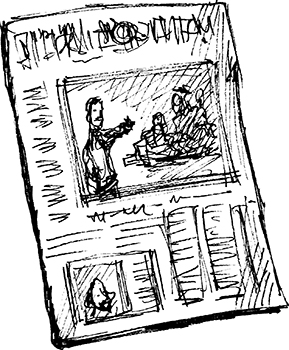
Neil wasn’t sure what had convinced Jones that Rose was innocent, but Neil was still pretty convinced of the opposite. He’d tried to suggest they were heading for a trap, but Jones shook his head angrily.

“While we drive to the theater so I can have a look around,” Jones said, “you figure out what all the clues mean when you put them together.”
Neil tried to remember all the details Skink had told him. Larry drew a picture.
“So this shield, or whatever it was, seemed to suggest Shakespeare now had everything he needed to find the jewel.”

“It might have had numbers, but Skink didn’t mention them. He just said the jewel was now close at hand, and that the key was ready for the lock.”
“I don’t get it. We should have all the pieces now. We have all the clues that Kemp refers to in the key code.” Larry rubbed his scraggly beard and leaned back in his seat.
“Maybe this was just a cruel trick all along,” Isabella said.
Neil looked out the window and saw the marquee for the theater. The posters were still up for Macbeth, as if nothing had happened. Maybe Cordelia was in the ticket booth. Maybe she could answer some questions?
Jones didn’t stop.
“Hey, Jones, we’re passing the theater!” Neil said. He tapped on the driver’s seat. “Jones, that’s the theater back there!”
Jones said nothing, but drove on.
Neil slumped in his seat and watched the theater disappear. “Why aren’t you stopping?” Neil said again to the silent back of Jones’s head.
Had Jones seen someone milling around? Were the police back there, cordoning it off? Neil had wanted to call them to let them know what had happened, but Jones had said no to that plan. “If Rose isn’t working with them, then it was the real Queen who called you, not Rose, which means involving the local constabulary will only complicate things.”
Jones was getting more loquacious the longer they spent here.
They kept driving through the winding London streets. Finally Jones made a quick right turn and then stopped.
“That’s why you didn’t stop; we’re being followed.” Neil turned to look out the back window and finally heard Jones’s voice: “Don’t let them see you. If we are being followed, we don’t want to tip them off that we know.”
“Don’t we?” Neil said.
“No. We want to trap them and then jump them,” Jones said, stealing a quick glance in the rearview mirror.
“Are you sure we want to do that?” Neil said, imagining the guns and knives that might actually be in the pockets of whoever Jones was planning to “jump.”
Jones said nothing, but Neil thought he saw his shoulders relax. “False alarm,” Jones said. He gunned the engine, then drove a few more blocks.
“So now we can go back to the theater?” Neil said.
Jones shook his head. “No need. Wrong theater.”
“What do you mean, ‘wrong theater’?” Neil said. “Skink was there. He attacked me. He probably has the shield with him.”
“I did a little research last night while you were having your beauty sleep,” Jones said. “That wasn’t the theater where they found the shield. Think about it for a second.”
Neil could have kicked himself. Of course! Skink had said that they’d found the shield in the foundation of Lane’s original theater. The theater where they were staging Macbeth had been bought later.
“But Skink never told me where the original theater was,” Neil said.
Jones didn’t say anything, but he did pass a sheet of paper over the seat to Isabella. It was a photocopy of a newspaper article from about twenty years before.
SHAKESPEARE’S FOUNDATIONS UNCOVERED screamed the giant headline.
Then there was a half-page picture of a giant hole with what appeared to be the ruins of numerous brick and stone walls. A caption underneath read, The remains of an Elizabethan theatre, discovered this week near the Thames.
Isabella read the first few paragraphs.
“ ‘Lord Aloysius Lane thought he was building a theater to stage Shakespeare; instead he found a theater where Shakespeare staged himself. Lord Lane’s company had just completed demolition of a Victorian-era factory. Local legend always held that an old theater—the Raven—had once stood on the spot. However, there was no physical evidence to support the claim.’ ”

“It fits with Skink’s story so far,” Neil said.
Larry beamed. “And it was called the Raven!”
Isabella continued. “ ‘But now that crews have uncovered the remains, there seems little doubt that the Raven was here. Scholars are already flocking to the scene. “It’s an amazing discovery,” said Lord Lane, looking over the site. “We also found an old iron box, but the contents had rotted with the damp.” Scholars such as Oxford’s Arthur Gawain say the planned development must stop at once. “This site must be preserved for future generations,” said Mr. Gawain.’

“It says the story is continued on page twelve, but this is just a copy of the cover page,” Isabella said.
“What’s this story down here?” asked Larry. He pointed to a box on the lower left of the front page. The headline read SHAKESPEARE’S IDENTITY QUESTIONED.
Isabella had to hold the paper up close to read the small print. “It’s a little smudged from the photocopier, but it quotes some scholar suggesting the Raven shows Shakespeare couldn’t have written his plays.”
“Why not?” Neil said.
Isabella read the bits she could make out.
“ ‘The Raven was in a wealthy part of town, built before Shakespeare became famous. It’s more proof that a commoner such as this Shakespeare could not have written the plays himself. Where would he have found the money to build a theater? No, it’s evidence that the real Shakespeare must have been a member of the aristocracy. Too ashamed to admit to the lowly art of theater, he hid his true identity,” Lord Lane agrees. “It is obvious!” he told the Daily Moon.’ ”
“That seems a bit snobby,” Larry said.
“Exactly,” Jones said from the front seat. “That’s why Rose has always been such a Shakespeare nut. She detests the so-called deniers.”
Isabella nodded. “She doesn’t come from what you would call the upper class. She wants to prove that Shakespeare wrote his plays himself, that even people from the so-called lower classes could make it to the top. Perfume is her genius, but proving Shakespeare wrote the plays is her passion.”
“That’s why the whole story rang a bell last night,” Jones said. “I remember Rose mentioning this Raven Theatre. It’s also why I know she would never work for someone who thought Shakespeare was too ‘lowbrow’ to be great.”
“So what does the rest of the article say about the Raven?” Larry asked.
“Later,” Jones said, pulling the car into a parking lot. “We’re here.”
“Here” turned out to be a giant hole in the ground. Neil thought it looked like the hole they’d seen in South London, where Kemp had buried the honey. In short, a construction site.
But there didn’t seem to have been any construction on this site since the photo in the paper twenty years before, excluding a chain-link fence that the city had erected around the perimeter.
Jones gave a sharp laugh. “Lane lost a bundle when the protestors and scholars stopped the development. The government refused to compensate him. Told him he should have done more research.”
“Couldn’t he sell tickets or something?”
“To see what? Old rubble? You trip over this stuff all the time in England. Unless you can come up with a plan to rebuild the theater, like they did with the Globe, you won’t make much money.”
“Did he try that?”
“They wouldn’t let him cover up the foundations.”
“And they wouldn’t let him use them to rebuild the theater,” Larry said. “I believe they call that between a rock and a hard place.”
They walked around the entire site. Neil looked over his shoulders nervously, hoping they weren’t being watched.
“What are you looking for, Neil?” Isabella said, watching him fidget.
“Skink. Or Rose. Or . . . both.” Neil was still reserving his judgment.
“Why would Skink come back here?” Larry said. “Doesn’t he already have the shield from this place?”
Neil nodded. “But Skink has been following us this entire trip. I’ve been smelling my food—faintly, but there—for days. Also, traces of the honey and even the pee from those tweed jackets. Skink was with us at Clement’s Inn. He was with us at Westminster and at the tower.”
“He was the fake yeoman!” Isabella said. “Of course. The uniform was a theater costume from some play he’d been in.”
“I should have trusted my nose more,” Neil said.
Jones walked over. “And if Rose were working for him, why would he need to be at any of those places at all? Let’s go.”
“Go? Aren’t we here to look for something?” Larry said.
Jones stared from Larry to the gaping hole. “Good luck,” he said. “I only came here to show you the actual location of the last clue, in case it triggered something.”
As they walked back to the car, Neil had an idea. He snapped his fingers. “Larry, give me the map.” They spread it out on the hood of the SUV.
“So where are we now?” Neil asked.
Jones scanned the map, and then pointed to a spot in South London, near Waterloo tube station. “We are here.”
“But if we know that, then we know all the points Kemp wanted Shakespeare to find, right?” Neil said.
“Let see if there’s any shape there.” Larry pulled out a pencil and drew a line between all the places where Kemp had hidden clues. Then he stood back and looked.
“It looks like a, well, it looks like a snake,” Larry said, confused. “Was there ever a theater called the Snake?”
“I doubt it,” Jones said.
Isabella looked at the map and then the area around them. “And the last clue was about Othello and a handkerchief. How does this place tie in to that?”
Larry and Neil looked at each other.
“Stumped.”
“Maybe the final clue was a really personal one . . . one only Kemp and Shakespeare would understand.”
“Maybe this was where they had a fight, or first met, or . . . I have no idea,” Neil said. “Or maybe we were wrong about the whole Othello thing.”
“The snake might seem weird, but is it a pattern?” Isabella said, looking back at the map.
“Yes, but a pretty useless one,” Neil said.
Jones honked the horn and they all jumped.
“We can take a hint!” Larry said, folding up the map and sticking it back in his pocket.
Jones honked again.
They tumbled into the car and Jones pulled away. “So, Holmes and Watson, where to now?”
“Either a snake emporium or the zoo,” Larry said. “But I think a café first.”
Neil felt frustrated, a feeling he was growing sick of. His eye fell on the photocopy of the front page of the Daily Moon. He picked it up as a soft drizzle began to fall outside. Something in the upper left of the picture caught his attention. A man, wearing tweed, was posing to the side of the rubble, his blinking face caught in the light of the photographer’s flash.
Neil didn’t know what Cullen Skink looked like, but the man who stared back at him now was definitely the man he knew as Lord Lane.